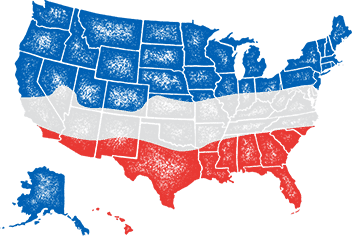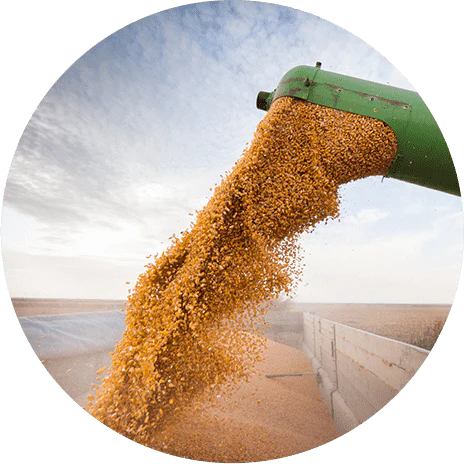
- When to plant:
- Spring, Summer
- Fertilizer:
- Hancock's 16-04-08 Lawn & Pasture Fertilizer
- Seeding rate:
- 12 - 15 lbs.
- Overseeding rate:
- 10 - 12 lbs. per acre
- Seeding depth:
- 1/8 - 1/4 inch
- Ideal ph:
- 5.5 - 7.0
- Gmo:
- No
- Inoculant needed:
- No
- Coated or raw:
- Coated
- Lifecycle:
- Perennial
- Climate zones:
- Transition Zone, Warm Season
The conditions on the ranch are intense in a variety of directions, and that's why Wrangler Bermuda Grass Seed has been developed to withstand both high and low temperatures. Wrangler Bermuda grass, coated and unhulled, is a cattleman's choice for high quality forage in the tough growing conditions of the transition and southern climates.
Product Information
- Application or Use: Pasture, Hay Production, Cattle Forage, Livestock Grazing
- Germination Time: 7 - 14 days, under optimal conditions
- Growing Locations: Warm Season & Transition Zone
- Height: 8 - 20 inches
- Sunlight Requirements: 8+ hours, full sun for best results
- Advantages: Cattleman's choice for high quality forage in the tough growing conditions of the transition and southern climates.
- When to Plant: Recommended planting time is spring and summer when night time temperatures are consistently above 65 degrees and 3 months prior to first frost.
Product Detail
- Consistently outperforms other varieties
- Excellent for pasture, hay or soil conservation
- Well adapted to the transition zone
- High quality forage
- Similar in appearance to Coastal and Tifton 44 Bermuda varieties
Product Information
Wrangler Bermuda grass is similar in appearance to Coastal and Tifton 44 Bermuda varieties. Wrangler Bermuda has consistently outperformed Guymon, Mirage, and Cheyenne in tests. The overall performance of Wrangler is comparative to Tifton 44 in the forage trials of the South. The performance of Wrangler has been exceptional for a seeded variety when compared to the hybrid vegetative types.
Wrangler Bermudagrass is much more cold tolerant than the older Bermudagrass pasture and hay varieties. Wrangler is an excellent choice for pasture, hay, or soil conservation in temperate and subtropical regions. Wrangler Bermuda Grass excels in states from Kansas, east to Virginia, where other Bermudagrasses typically fail. Wrangler is well adapted to the transition zone of the United States (OK, KS, MO, AR, TN, VA, etc.) where winterkill of Arizona common and other bermuda grass is a problem.
*Product packaging may appear different than what is pictured.
Wrangler Bermuda should be planted during late spring, when soil temperatures are 65 degrees or above. Planting through summer months is successful if moisture is available for germination and seeding establishment. Prepare a firm seedbed free of weeds and clods to provide good soil-to-seed contact. The pH should be checked prior to planting - a range of 6.0 to 7.5 is sufficient.
A fertilizer low in nitrogen, but high in phosphorous and potassium is recommended as a starter fertilizer to promote seedling vigor without promoting excessive weed growth. Increase nitrogen as seedlings develop and a sod forms. Weed Control is not recommended in the seedling stage and residual herbicides are not recommended in the first 60 days.
If applicable, keep soil moist for germination, as seedlings develop to reduce frequency of watering, but increase the amount.
Harvest every 30 to 60 days, depending on fertility and soil moisture. As a rule, the more frequent cuttings provide higher quality forage with less total dry matter, while less frequent cuttings reduce quality but increase dry matter production.
A total of 100 to 200 lb. per acre per year of actual nitrogen is recommended based on expected precipitation and level of dry matter production or quality desired. The nitrogen should be split into at least two applications; the first in early Spring and the second in mid-Summer. Minimum soil levels of 65 lbs. per acre phosphorous and 200 lbs. per acre Potassium should be maintained for maximum production at the desired nitrogen level.
For best results, please review our Planting Guide and the specific product description before planting. Each product has recommended planting methods, timing, and seeding rates that are important for successful establishment. Following these guidelines will help ensure optimal performance and stand success.

Seed Quality
Hancock Seed is dedicated to delivering the best seeds possible to our customers. Hancock Seed grows and harvests many of our products, and we acquire the majority of the rest from other family farmers.
All these seeds are processed, packaged and shipped from Hancock Farm. This helps us ensure that our high standards are met. Unlike much of the competition, we refuse to sell you a seed that was not gathered during the last harvest. You will always receive fresh product from Hancock.
Every seed we grow comes with 40 years of experience behind it...you can rest assured that all of our products are cultivated in a method that assures its potential for growth.

Your cart ( 0 )

The conditions on the ranch are intense in a variety of directions, and that's why Wrangler Bermuda Grass Seed has been developed to withstand both high and low temperatures. Wrangler Bermuda grass, coated and unhulled, is a cattleman's choice for high quality forage in the tough growing conditions of the transition and southern climates.
Product Information
- Application or Use: Pasture, Hay Production, Cattle Forage, Livestock Grazing
- Germination Time: 7 - 14 days, under optimal conditions
- Growing Locations: Warm Season & Transition Zone
- Height: 8 - 20 inches
- Sunlight Requirements: 8+ hours, full sun for best results
- Advantages: Cattleman's choice for high quality forage in the tough growing conditions of the transition and southern climates.
- When to Plant: Recommended planting time is spring and summer when night time temperatures are consistently above 65 degrees and 3 months prior to first frost.
Product Detail
- Consistently outperforms other varieties
- Excellent for pasture, hay or soil conservation
- Well adapted to the transition zone
- High quality forage
- Similar in appearance to Coastal and Tifton 44 Bermuda varieties
Product Information
Wrangler Bermuda grass is similar in appearance to Coastal and Tifton 44 Bermuda varieties. Wrangler Bermuda has consistently outperformed Guymon, Mirage, and Cheyenne in tests. The overall performance of Wrangler is comparative to Tifton 44 in the forage trials of the South. The performance of Wrangler has been exceptional for a seeded variety when compared to the hybrid vegetative types.
Wrangler Bermudagrass is much more cold tolerant than the older Bermudagrass pasture and hay varieties. Wrangler is an excellent choice for pasture, hay, or soil conservation in temperate and subtropical regions. Wrangler Bermuda Grass excels in states from Kansas, east to Virginia, where other Bermudagrasses typically fail. Wrangler is well adapted to the transition zone of the United States (OK, KS, MO, AR, TN, VA, etc.) where winterkill of Arizona common and other bermuda grass is a problem.
*Product packaging may appear different than what is pictured.
Wrangler Bermuda should be planted during late spring, when soil temperatures are 65 degrees or above. Planting through summer months is successful if moisture is available for germination and seeding establishment. Prepare a firm seedbed free of weeds and clods to provide good soil-to-seed contact. The pH should be checked prior to planting - a range of 6.0 to 7.5 is sufficient.
A fertilizer low in nitrogen, but high in phosphorous and potassium is recommended as a starter fertilizer to promote seedling vigor without promoting excessive weed growth. Increase nitrogen as seedlings develop and a sod forms. Weed Control is not recommended in the seedling stage and residual herbicides are not recommended in the first 60 days.
If applicable, keep soil moist for germination, as seedlings develop to reduce frequency of watering, but increase the amount.
Harvest every 30 to 60 days, depending on fertility and soil moisture. As a rule, the more frequent cuttings provide higher quality forage with less total dry matter, while less frequent cuttings reduce quality but increase dry matter production.
A total of 100 to 200 lb. per acre per year of actual nitrogen is recommended based on expected precipitation and level of dry matter production or quality desired. The nitrogen should be split into at least two applications; the first in early Spring and the second in mid-Summer. Minimum soil levels of 65 lbs. per acre phosphorous and 200 lbs. per acre Potassium should be maintained for maximum production at the desired nitrogen level.
Instructions
For best results, please review our Planting Guide and the specific product description before planting. Each product has recommended planting methods, timing, and seeding rates that are important for successful establishment. Following these guidelines will help ensure optimal performance and stand success.




















